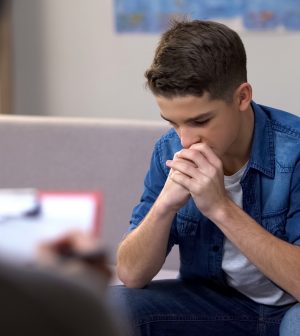- Could Your Grocery Store Meat Be Causing Recurring UTIs?
- Are You Making This Expensive Thermostat Error This Winter?
- Recognizing the Signs of Hypothyroidism
- 10 Strategies to Overcome Insomnia
- Could Artificial Sweeteners Be Aging the Brain Faster?
- Techniques for Soothing Your Nervous System
- Does the Water in Your House Smell Funny? Here’s Why
- Can a Daily Dose of Apple Cider Vinegar Actually Aid Weight Loss?
- 6 Health Beverages That Can Actually Spike Your Blood Sugar
- Treatment Options for Social Anxiety Disorder
Bigger Families Could Mean Poorer Mental Health for Kids

A crowded house may not be the best for the mental health of a family’s kids, a new study has found.
Teens from larger families tend to have poorer mental health than those with fewer siblings, according to a large-scale analysis of children in the United States and China.
In the United States, children with no or one sibling had the best mental health, while in China well-being was best among only children, says the report published Jan. 9 in the Journal of Family Issues.
Having older siblings and siblings closely spaced in age tended to have the worst impact on kids’ mental health, the U.S. data revealed.
The strongest negative associations with mental health were observed among siblings born within a year of each other, results show.
The results likely are best explained by “resource dilution,” said lead researcher Doug Downey, a professor of sociology at Ohio State University.
“If you think of parental resources like a pie, one child means that they get all the pie — all the attention and resources of the parents,” Downey said in a university news release. “But when you add more siblings, each child gets fewer resources and attention from the parents, and that may have an impact on their mental health.”
That explanation is given more weight by the fact that closely spaced siblings have the most negative impact, as kids nearer in age will be competing for the same types of parental resources, Downey said.
However, it’s also possible that families with many children differ in other ways that might affect their kids’ mental health, Downey added.
For example, in both China and the U.S. families that were the most well-off had the best mental health.
“What we found is that when you add all the evidence up, the effect of siblings on mental health is more on the negative side than the positive side,” Downey said.
One drawback to the study is that the data didn’t include the quality of sibling relationships, Downey said. Strong and positive sibling relationships could be more beneficial to children and have positive effects on mental health.
Other research has also shown that having more brothers and sisters is associated with better social skills among kindergarteners and a lower likelihood of divorce among adults, Downey noted.
“This combination of results is not easily explained. We still have more to learn about the impact of siblings,” Downey said. “This is particularly important now as the U.S. and other countries have lower fertility rates. Understanding the consequences of growing up with fewer or no brothers and sisters is an increasingly important social issue.”
For the study, researchers analyzed data drawn from more than 9,400 eighth graders in China and 9,100 American eighth graders as part of ongoing studies in each respective country.
Chinese kids have, on average, one or fewer siblings (0.89), while U.S. kids have an average 1.6 siblings.
Meanwhile, one-third of Chinese children are only children, compared to nearly 13% of American kids, the data showed.
More information
Harvard Medical School has more on the mental health crisis among children.
SOURCE: Ohio State University, news release, Dec. 9, 2023
Source: HealthDay
Copyright © 2026 HealthDay. All rights reserved.










